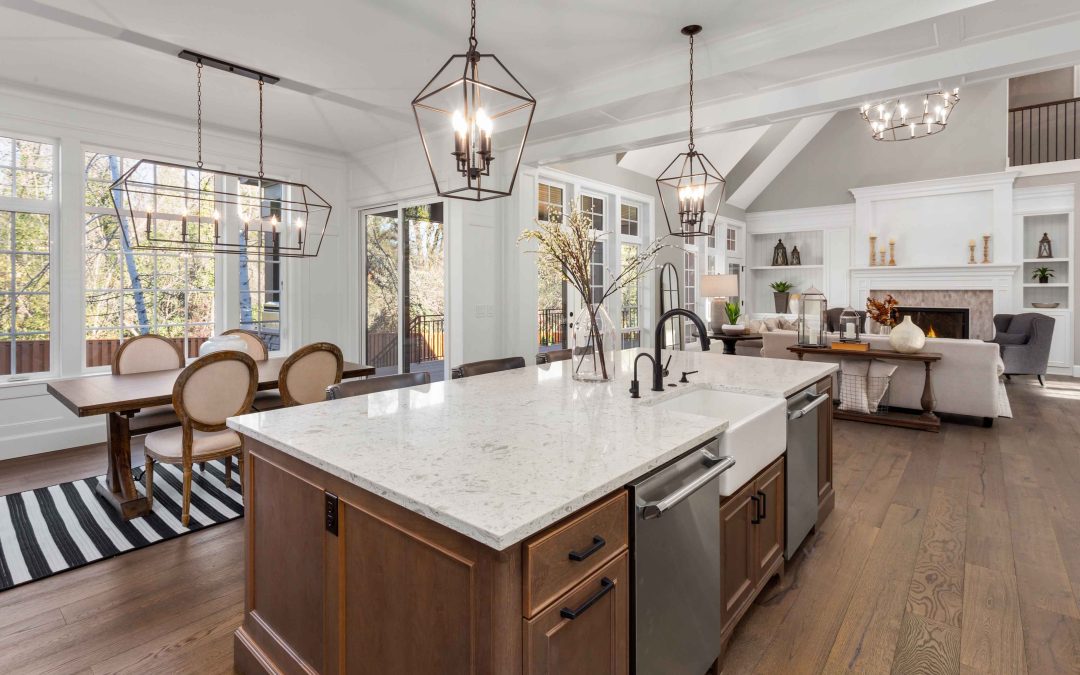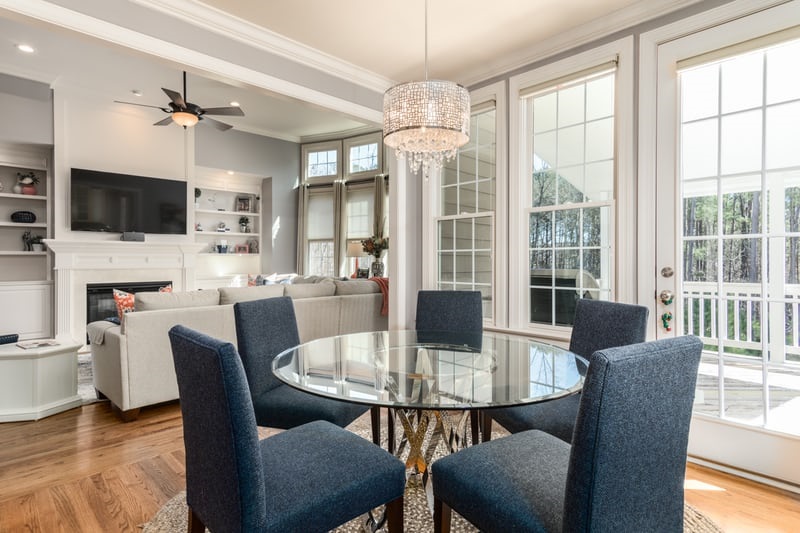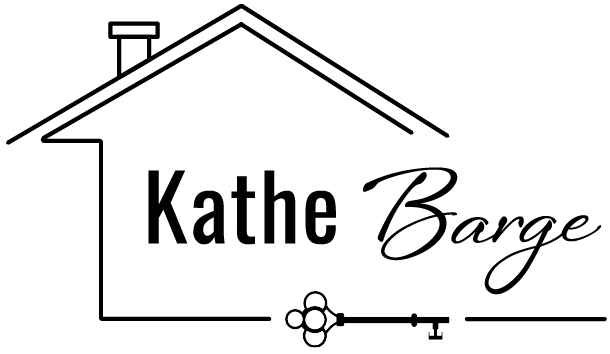
by Kathe Barge | Mar 18, 2025 | Buyers, Buying Conditions, Investment Properties, Listings, Market Trends, Property Value
Dear Kathe: What Costs Should You Expect When Owning a Vacation Home?
Owning a vacation home is an exciting investment—one that provides a personal retreat, potential rental income, and long-term financial benefits. While many buyers focus on the purchase price, it’s also important to plan for the ongoing costs that come with ownership. Understanding these expenses upfront ensures a smooth, stress-free experience, allowing you to fully enjoy your home-away-from-home.
One consideration is maintenance. A well-cared-for home holds its value and remains a relaxing escape for years to come. Routine upkeep, such as landscaping, seasonal preparations, and general maintenance, helps protect your investment and keeps your home in top condition. Many owners choose to hire a local caretaker or property manager to handle these details, especially if they aren’t at the home full-time.
Insurance is another factor to keep in mind. Depending on the location, you may need additional coverage for weather-related risks such as wind, flood, or wildfire. Premiums can vary, but the right policy provides peace of mind, protecting both your property and your investment.
If your vacation home is in a community with shared amenities like pools, walking trails, or concierge services, homeowners association fees may apply. These fees contribute to the upkeep of the neighborhood, ensuring that common areas and amenities remain pristine and enjoyable for all residents.
Utility costs depend on the home’s size, usage, and climate. Some owners find that smart home technology, such as programmable thermostats and security systems, helps them manage expenses efficiently, even when they’re away.
For those looking to offset costs, renting out a vacation home when it’s not in use can be an excellent option. Many owners successfully generate income by offering their property as a short-term rental, helping to balance expenses while allowing others to enjoy the home. Working with a professional property manager can make the process seamless.
Despite the expenses, owning a vacation home remains an appealing choice for many buyers. Unlike renting, where costs go toward someone else’s property, every dollar spent on a second home builds equity in an appreciating asset. Over time, real estate in desirable locations tends to increase in value, making ownership both a lifestyle upgrade and a long-term financial investment.
Finding the perfect vacation home starts with the right guidance. Through the Sotheby’s International Realty network, I can connect you with top-tier real estate professionals in any destination, whether you’re looking for a beachfront escape, a cozy mountain lodge, or a serene countryside retreat. With access to exclusive properties and deep local expertise, I’ll help you find a home that fits your vision and investment goals.
Thinking about purchasing a second home? Let’s talk—I’d love to help make it happen!

by Kathe Barge | Mar 18, 2025 | Buyers, Buying Conditions, Contracts, Interest Rates, Investment Properties, Market Trends
Should You Buy a Second Home or Rent One?
A second home is more than just a getaway—it’s an investment in your lifestyle and your future. Whether it’s a beach house, a ski chalet, or a serene retreat in the countryside, owning a second home provides a level of comfort, consistency, and long-term financial benefits that renting simply can’t match.
One of the biggest advantages of buying a second home is the ability to create a space that truly feels like yours. Unlike a rental, where you’re at the mercy of availability, price fluctuations, and ever-changing policies, ownership gives you stability. You never have to worry about booking your favorite place months in advance, finding out it’s unavailable during peak season, or dealing with rising rental costs. Instead, your second home is always waiting for you—perfectly set up with your belongings, personalized to your taste, and ready whenever you need an escape.
Financially, purchasing a second home allows you to build equity rather than spending money on temporary stays with no return. Over time, many second-home markets have shown strong appreciation, turning a lifestyle purchase into a smart long-term investment. Instead of pouring money into short-term rentals, you’re putting it toward an asset that can grow in value and potentially generate income if you choose to rent it out when you’re not using it. While rental management requires some planning, the right property in the right market can significantly offset ownership costs.
Beyond financial benefits, owning a second home opens the door to a deeper connection with a community. Instead of being a visitor, you become part of a neighborhood, forming lasting relationships and truly getting to know the area. Whether it’s a favorite café where they know your order, a group of neighbors who become lifelong friends, or simply the joy of returning to a place that feels like home, these are experiences renting can’t offer.
Of course, buying a second home is a big decision, and choosing the right location, property, and market conditions is key. That’s where working with a knowledgeable real estate professional makes all the difference. Through the Sotheby’s International Realty network, I can connect you with the very best agent in any destination, whether you’re looking for a mountain retreat in Aspen, a beachside villa in the Carolinas, or a vineyard estate in Napa. With access to unparalleled local expertise and the world’s most exclusive properties, we can find the perfect second home to fit your lifestyle and goals.
Thinking about making your second home a reality? Let’s talk—I’d love to help!

by Kathe Barge | Mar 1, 2025 | Buyers, Buying Conditions, Helpful Tips, Investment Properties, Property Value, Vacation Home
Is a Vacation Home a Good Way to Build Wealth?
Absolutely! A vacation home isn’t just a getaway—it can be a smart investment that builds long-term wealth while offering a place to relax and enjoy.
One of the biggest financial advantages of owning a vacation home is property appreciation. Desirable locations—beachfront communities, ski resorts, and charming retreat towns—tend to increase in value over time. Instead of spending money on rentals, every mortgage payment builds equity in an asset that may appreciate significantly.
Many owners also generate income by renting their home when they aren’t using it. In popular destinations, short-term rentals can help offset mortgage payments, property taxes, and maintenance costs. With today’s rental platforms and professional property management services, earning passive income while keeping the home available for personal use is easier than ever.
There may also be tax benefits, depending on how the property is used. Mortgage interest, property taxes, and certain expenses related to rental management could be deductible, making ownership even more attractive. A tax professional can help you navigate the details.
Beyond financial returns, a vacation home can be a lasting legacy—a place for family gatherings and future generations to enjoy. Choosing the right property is key, and expert guidance makes all the difference. Through the Sotheby’s International Realty network, I can connect you with top agents worldwide, ensuring you find the perfect vacation home to match your lifestyle and investment goals.
Thinking about a second home? Let’s talk—I’d love to help!

by Kathe Barge | Jan 27, 2025 | Buyers, Buying Conditions, Interest Rates, Market Trends, Pittsburgh, Property Updates, Property Value, Real Estate, Sellers, Selling Conditions
How is the housing market doing?
The housing market showed some spark in December, with home sales ticking up 2% from November—making it three months in a row of growth! Even better, sales were 9% higher than last December, a big improvement after a long slump.
Inventory is still tight, which means home prices stayed high. The median price hit $404,100, up 6% from last year. Demand is being fueled by a strong job market—employers added over 250,000 jobs in December, the biggest boost since March!
Regionally, sales were up almost everywhere: 4% in the Northeast, 3% in the South and West, but down slightly (1%) in the Midwest. Both single-family homes and condos saw a solid bump in sales. Multifamily properties, which have struggled for years, finally saw an uptick too.
What’s ahead? With interest rates starting to ease and the economy holding steady, 2025 is shaping up to be a better year for buyers and sellers alike.
Got questions about the market or your plans? Let’s talk!

by Kathe Barge | Jan 27, 2025 | Buyers, Buying Conditions, Contracts, Helpful Tips, Insurance, Market Trends, Mortgage, Pittsburgh, Property Value, Real Estate, Security
With all the media attention on the California fires and how California is now undergoing a home insurance crisis– we are just curious, what do you foresee happening to homeowner insurance for homes in the Pittsburgh area?
The homeowners insurance market in Pennsylvania has been anything but predictable lately, and 2024 brought plenty of changes. Premiums skyrocketed—some as much as 50% (as was the case with our home)!—due to inflation, rising costs for building materials, and an increase in severe weather claims. On top of that, insurance companies tightened their rules, especially for older homes or properties in high-risk areas. Many homeowners now need inspections, updates, or even separate policies for things like flooding or wind damage just to maintain coverage.
Looking ahead to 2025, experts predict rates will continue to climb, with increases of 8-15% expected. But there are ways to ease the burden. Insurance companies are rewarding homeowners who invest in risk-reducing upgrades, like storm-resistant roofs, updated wiring, or fire-resistant landscaping. We added a whole house surge protector to our home to help mitigate the risk of future claims after we experienced a 2023 power surge that damaged many appliances. Small changes can add up, so it might be worth tackling those projects sooner rather than later.
Another way to manage costs is by raising your deductible. Many carriers are already requiring higher minimum deductibles, such as $2,500, so bumping it up even further could help lower your premiums. We made this choice in order to bring down the overall cost of our insurance, figuring we will not file smaller claims (as they will only increase future insurance rates). Bundling your home and auto policies is another smart way to save—your agent can help you explore these options.
The homeowners insurance market is complex and ever-changing, but staying proactive can make a big difference. With recent hurricanes and wildfires causing catastrophic damage in other states, it’s a sobering reminder that no home is completely immune to risk. Now’s the perfect time to review your policy, explore cost-saving options, and make sure your home—and your wallet—are ready for what’s ahead.

by Kathe Barge | Aug 6, 2024 | Buyers, Buying Conditions, Contracts, Helpful Tips, Inspections, Interest Rates, Listings, Market Trends, Mortgage
We’re first-time home buyers. Where do we begin? (Part 4 of 4 – Last Chapter)
As you approach the final stretch of your home buying journey, it’s time to focus on the crucial steps that will bring you to the finish line. After months of searching, negotiating, and securing financing, you’ll need to ensure that all remaining documents are in order for your lender. This might include providing the latest pay stubs, bank statements, or any other documentation that the lender requires to finalize your mortgage. Additionally, securing homeowners insurance is a critical step that must be completed before closing. Start shopping for insurance early to compare coverage options and rates, ensuring that your new home is well-protected from the start. It’s also time to turn your attention to connecting utilities. Contact your local utility providers—such as electricity, gas, water, internet, and waste management—to set up new accounts and arrange for service activation.
Finally, as the closing date approaches, conduct a final walkthrough of the property, usually a day or two before closing. This walkthrough is your opportunity to verify that the property is in the condition agreed upon and that any repairs negotiated in the contract have been completed. Carefully inspect each room, test appliances, and ensure that everything is functioning as expected. If any issues arise, discuss them with your real estate agent immediately. On closing day, be prepared with a driver’s license or passport. Once everything is signed and the closing costs are paid, you’ll receive the keys to your new home, marking the completion of your journey and the beginning of a new chapter in your life. Congratulations on becoming a homeowner!

by Kathe Barge | Jul 22, 2024 | Buyers, Buying Conditions, Contracts, Helpful Tips, Interest Rates, Listings, Market Trends, Mortgage, Property Updates, Property Value
We’re first time home buyers. Where do we begin? (Part 3)
If you are following along, so far you have gotten pre-approved for your mortgage, researched and chosen a buyer’s agent to be your advocate, saved money for your down payment, shopped for a home and gotten one under agreement. Now the fun continues!
Once you have a home under agreement and have deposited your hand money, you will be ready to schedule your inspections. Your buyer’s agent should provide you with guidance in finding reputable home inspectors. You will want to consider scheduling a general home inspection as well as inspections for radon, wood boring insects (termites), mold, and possibly sewer lines, septic systems and wells. You generally have 10 – 14 days to complete your inspections. At the end of that period, you will need to make a request of the seller if you would like any items addressed. To reach a successful conclusion of negotiations, keep some simple tips in mind. First, you should have considered anything on the disclosure when you were making the offer – its not a great idea to revisit disclosed items. The same can be said for items you could have easily seen. If the inspector notes that the driveway is cracked and you should have seen it while visiting the home, asking for the seller to pay for a new driveway will also not be well received. So, when deciding what, if anything, to request of the seller, eliminate disclosed items and things you noticed when visiting the home and then turn your focus to the items that concern you most. Of course, if there were multiple offers and you were the winner in a bidding war, you may not be able to ask for much if anything as there is likely another buyer on standby! Ultimately, you and your seller will need to reach a compromise on the inspection issues and that agreement will be formalized in a written addendum to your Agreement of Sale.
At the same time you are working through inspections, you will also need to make application for your financing. This must be complete (in other words, you must have all of your paperwork to your lender) within 7 days of the final Agreement of Sale. Applying for a mortgage these days can seem quite challenging – be prepared for the lender to ask for what will seem like a mountain of documents. And do NOT make any major purchase until after you close on your home – changes to your outstanding debt at this point could affect your ability to qualify for a loan at all! Once you get through inspections and mortgage application, it should be smooth sailing. We will cover the final step in the process next time!
taking-the-first-steps-part-one
taking-the-steps-part-two

by Kathe Barge | Jul 3, 2024 | Buyers, Buying Conditions, Contracts, Helpful Tips, Inspections, Interest Rates, Listings, Market Trends, Mortgage, Property Value, Real Estate
We’re first time home buyers. Where do we begin? (Part 2)
For those of who just picking up the conversation today, check out Part One to read my introduction to the home buying process. If you are following along, so far you have gotten pre-approved for your mortgage, researched and chosen a buyer’s agent to be your advocate, and hopefully saved money for your down payment. Now the fun begins!
Once you are pre-approved for a loan and have determined what price range you are comfortable shopping in, you can start your home search. Typically, this begins with an online search – your buyer’s agent should set you up to receive new properties as they become available. As interesting homes come on the market, you will want to tour them immediately. In most price ranges, we have an extreme shortage of inventory and those who snooze tend to lose. It is important to have seen enough properties upfront so that when you see the right one, you know it and are ready to make a move. When evaluating homes, it is also important to be realistic. There is no perfect home, so establish your list of criteria upfront. If a home achieves 7 out of 10 wish list items, in real estate we call that a home run. If you are going to hold out for all 10, a move is probably not in the cards for you in the short run.
Once you find a home that works for you, in this market you do need to anticipate a bidding war is a realistic possibility. Interestingly, even homes that have sat on the market for seemingly prolonged periods of time will often receive multiple offers, so do not delay in making an offer if you like a home. If there are multiple offers, do not assume you will get a second chance – work with your buyers offer to make the highest, “cleanest” offer that you can out of the gate.
Once you have a home under agreement and have deposited your hand money (anticipate 1%-5% of your purchase price depending on your price range), you will be ready to schedule your inspections. Next week I will talk more about inspections and how to get through them!
taking-the-first-steps-part-one
taking-the-first-steps-part-three

by Kathe Barge | Jun 26, 2024 | Blog, Buyers, Buying Conditions, Contracts, Helpful Tips, Interest Rates, Listings, Market Trends, Mortgage, Property Value
We’re first time home buyers – where do we begin?
Buying a home is one of the best choices you can make. Rather than paying money to your landlord so that he can be closer to owning an asset outright each month, when you make your monthly payment each month a portion actually goes to your benefit – when you sell the home someday, as long as the market is in a good place, that money is refunded to you (called equity) and you can use it to buy again. It is, in effect, a forced savings plan and over time you can amass quite a large amount of savings while you are simply doing what you would have done otherwise – paying for housing each month.
To buy a home, however, you must have two things to start: a down payment and good credit. There a host of specialty loan products for first time home buyers far too extensive to review here, but figure on saving no less than 2.5% of the purchase price for a down payment if you are able to use an FHA product or 10% if you are going to use a typical mortgage. Credit scores are also key. Again, there are many things you can do to help or hurt your credit as you prepare to buy your home. Do not open any new credit – don’t buy any new cars. Pay all bills on time. Even if you are not ready to buy yet, it’s a great idea to connect with a reputable local mortgage broker right away to make sure you are headed in the right direction. (I can help facilitate this connection for you).
When you think you are ready, start by finding a full-time buyer’s agent. A Buyer’s Agent is looking out for your best interests from the outset. Check the agent’s personal website, LinkedIn page, Google business page and professional credentials, review their references, and interview if you wish. Make sure you understand what the agent will do for you and be sure you have done your homework and are selecting the best agent for your needs. Buying a home may be your largest investment – choose the agent who represents you once you have done your thorough due diligence. Once you select an agent, you will need to sign two documents: a Consumer Notice, informing you of your rights, and a Buyer Agency Agreement, whereby you actually hire the agent to work for you.
If you have not already done so, you should work with your agent to get a mortgage pre-approval. The mortgage broker will review your assets, liabilities and credit and give you a written statement of how much you can afford to buy. This step cannot be skipped. There is no sense looking at homes you can’t afford.
With pre-approval in hand and agent on board, you are now ready to begin the home buying process…stay tuned – in two weeks I will continue to walk you through the process…it’s when the fun begins!
taking-the-first-steps-part-2
taking-the-first-steps-part-3

by Kathe Barge | Jun 10, 2024 | Buyers, Buying Conditions, Interest Rates, Market Trends, Mortgage, Property Value, Sellers, Selling Conditions
How do the interest rates affect my ability to buy a home? Should I wait for rates to come down before moving?
Interest rates directly impact the affordability of a mortgage, as they affect your monthly payments and the total cost of the loan. Higher interest rates lead to higher payments, which can limit the price range of homes you can afford. Conversely, lower interest rates reduce monthly payments, making it easier to afford a more expensive home.
However, waiting for interest rates to drop is probably not advisable. Real estate markets are dynamic, with home prices increasing over time. By waiting for lower rates, you will likely find that home prices have risen, negating any benefit from the lower rates. Additionally, the timing of rate changes is uncertain, and waiting could mean missing out on current opportunities. The interplay between interest rates and home prices means that delaying your purchase could lead to higher overall costs. Additionally, lower rates will bring more buyers to the market and if buyer demand outpaces supply (as it has been recently), waiting could result in fewer available options, higher competition among buyers and even higher prices.
It’s generally better to focus on your personal financial situation and housing needs rather than trying to predict market movements. If you find a home that fits your budget and meets your needs, buying now can provide stability and allow you to start building equity at today’s prices. Fixed-rate mortgages offer the advantage of predictable payments, and if rates fall in the future, refinancing can provide a path to lower payments. The key is to make a decision based on your personal circumstances rather than trying to time the market perfectly.

by Kathe Barge | May 28, 2024 | Buyers, Buying Conditions, Contracts, Helpful Tips, Listings, Sellers, Sellers-Contracts, Selling Conditions
How can I effectively negotiate the price of a home? What strategies work best?
Begin with a strong position by showing that you are a serious buyer. This involves being well-prepared with a mortgage pre-approval and a readiness to move quickly. Sellers are often more willing to negotiate if they see that the transaction is likely to proceed smoothly and without delay. Show your commitment by ensuring all your documentation is in order, and express your readiness to close the deal to instill confidence in your offer.
During negotiations, keep an eye on the market dynamics. If homes in the area are selling quickly, you may need to adjust your strategy to be more competitive. However, if homes are lingering on the market, you may have more leverage to negotiate a lower price. Use this market data to inform your strategy, adjusting your offer according to how the local market is behaving. This knowledge not only helps in making a reasonable offer but also in setting your limits during negotiation.
Lastly, don’t hesitate to ask for concessions that can effectively lower the overall cost of the transaction. For instance, you can request the seller to cover certain closing costs or repairs that need to be addressed. These concessions can be just as valuable as a lower purchase price, and sometimes they are easier for the seller to agree to. By focusing on the total value of the package you’re getting, rather than just the purchase price, you can create win-win situations that make your offer more attractive while still keeping your expenses in check.

by Kathe Barge | May 13, 2024 | Buyers, Contracts, Helpful Tips, Inspections, Listings, Market Trends, Real Estate
What legal considerations should I be aware of when buying or selling a home?
Buying a home involves many legal components. Most buyers focus on how the house looks and give very little thought to the most important pieces of the transaction. One key legal consideration in real estate transactions is the proper drafting and understanding of the purchase agreement. This contract outlines the terms of the sale, including price, closing conditions, and any contingencies such as the buyer obtaining financing or the results of a home inspection. Both buyers and sellers should thoroughly review this document with their expert agent before signing to ensure all terms are clear and protect their interests. Any ambiguity or oversight in this contract can lead to disputes or financial losses.
Ensuring the legal integrity of the property’s boundaries is also crucial. Both buyers and sellers should have an up-to-date survey conducted to confirm property lines and identify any encroachments or easements that may impact ownership rights. Understanding these details helps prevent disputes with neighbors and ensures that all parties have clear expectations about the property’s limits.
Lastly, it is important that you have a good understanding of local zoning laws and regulations. Buyers should verify that their intended use of the property aligns with local zoning ordinances, which can affect everything from home renovations to business usage. Sellers must disclose any known zoning violations that could affect the property’s value or usability. Compliance with these laws ensures that buyers can utilize their new property as planned and avoids legal complications down the road. My legal education makes me uniquely qualified to help buyers and sellers avoid these and other legal pitfalls – connect with me for more information!

by Kathe Barge | Apr 26, 2024 | Buyers, Buying Conditions, Contracts, Helpful Tips, Inspections, Interest Rates, Listings, Market Trends, Mortgage, Property Value
What are some common mistakes homebuyers make and how can I avoid them?
One of the initial mistakes homebuyers often make the mistake of not getting pre-approved for a mortgage before starting their home search. This oversight can lead to disappointment if they find a home they love but then discover they are not qualified to purchase it. To avoid this, it’s essential to secure pre-approval from a lender early in the process. This not only helps you understand exactly how much you can afford but also strengthens your position when you’re ready to make an offer, showing sellers that you are a serious and prepared buyer.
Another significant mistake is skipping the home inspection process. While this may seem like a good way to save money or make a more appealing offer in a competitive market, it can lead to costly repairs down the line. A professional home inspection can uncover hidden problems with the home’s structure, systems, and appliances that might not be obvious to an untrained eye. Always include a home inspection contingency in your purchase offer, which allows you to renegotiate or withdraw if significant issues are discovered. This not only provides peace of mind but also protects your investment.
Finally, buyers often fall into the trap of emotional buying, where the decision to purchase is heavily influenced by first impressions rather than practical considerations. While it’s important to have a connection to the home you buy, letting emotions override rational decision-making can lead to overlooking critical flaws or financial missteps. To combat this, always have a list of must-haves and deal-breakers for your new home, and stick to it during your search. Thoroughly weigh the pros and cons before making your final decision to ensure the home meets both your emotional and practical needs.

by Kathe Barge | Mar 18, 2024 | Buyers, Buying Conditions, Contracts, Home Staging, Listings, Market Trends, Mortgage, Real Estate, Sellers, Sellers-Contracts, Selling Conditions
Many of you may have already heard about the proposed settlement from the National Association of Realtors (NAR) in regard to commissions. Don’t believe the sensational headlines. Commissions have not been slashed nationwide! Our media has become so sensational in recent years! Here is what is going on and what you might be interested in knowing. The litigation, as I discussed in an earlier Ask Kathe (available at AskKathe.com), centered around Sellers offering to pay buyers agent commissions. As you can imagine, many buyers don’t have enough funds available to pay their agents themselves. Sotheby’s parent company, Anywhere, already settled its stake in the litigation and the fall-out to consumers was simply that we had to inform sellers of their options when it comes to offering compensation to Buyers Agents and buyers of their rights and obligations under a Buyer Agency agreement. So what does this new proposed settlement mean? If the settlement is accepted by the court, then as of July (or sooner if adopted by a multilist (MLS) service):
- Realtors will no longer be able to list in the MLS what a seller is offering to pay a buyer’s agent. This does NOT mean sellers will stop paying Buyers agents. It does NOT mean that we can no longer communicate to Buyers agents what the seller is offering. This does NOT mean that buyers cant request, as part of their offer, that Seller’s pay their buyer’s agent commission. It just means we cant put it in the MLS.
- Realtors will be required to have a signed Buyer Agency Agreement with a consumer before showing them a home. What does this mean? You will need to sit down with the agent before viewing homes to review and sign the Buyer Agency Agreement, by which you will be assuming the responsibility for payment of the Buyer’s Agent commission should the seller not be offering to pay your agent’s fee. Does this mean that you will get stuck with the fee (typically 2.5% – 3%). Not necessarily. 99% of our sellers are still offering payment to the Buyer’s Agent and if they are not, you can still request the fee be paid as a condition of your offer. Unless you are going to open houses, this suggests you will need to sign a Buyer Agency Agreement to view homes. Does this mean you can call an agent to see a home because it looks interesting? Only if you are willing to sign a Buyer Agency Agreement and choose that agent as your agent. What this means to you is you SHOULD NOT push “Contact Agent” on Zillow or any other website and then go see a house with a random agent. You should do your research and choose a Buyer’s Agent before you do anything else. Get educated on what Buyer Agency means for you. And then move forward with all of the benefits that Buyer Agency brings to you, the consumer!
My colleagues report that in New York City, the most expensive city in our country, Sellers are still paying Buyers Agents as they have in the past. It will add an extra layer to your Buyer Agent’s job to ascertain those offers before taking you to see a home so that you can understand your potential liability. This should also wake the consumer up to stop blindly choosing agents, such as by pushing a “contact agent” button on a website, and take a minute to review agents’ websites online to learn about each agent’s qualifications and value proposition before signing up to be represented by them.

by Kathe Barge | Mar 15, 2024 | Buyers, Buying Conditions, Interest Rates, Listings, Market Trends, Property Value, Real Estate, Sellers, Selling Conditions
As a homeowner considering selling, I’m curious to know how election years typically affect the housing market.
Research indicates that election years indeed introduce notable dynamics into the real estate market. Studies suggest that during these periods, and particularly in the months immediately preceding the election, home prices may experience slower growth or even slight declines compared to non-election years. This phenomenon is often attributed to increased caution among both buyers and sellers, who may adopt a ‘wait-and-see’ approach amid the uncertainty surrounding potential policy changes.
While homebuyers and sellers are more cautious and hesitant during election cycles, data suggests that they typically choose to move forward. Additionally, elections wield influence beyond mere uncertainty—they can impact interest rate expectations, subsequently affecting mortgage rates. Changes in mortgage rates, in turn, can directly influence affordability and buyer demand, thus shaping housing market activity during election cycles.
While these trends offer valuable insights, it’s essential to contextualize them within the broader landscape of your local real estate market. Given our dramatically low inventory levels, we anticipate a strong sellers market at least though the mid-year point. If you are considering a move, I can help you navigate these nuances effectively, enabling you to make informed decisions aligned with your goals and market conditions.
In essence, while election years may introduce fluctuations and considerations, they need not deter you from pursuing your real estate endeavors. By leveraging my data-driven insights and expert guidance, you can navigate the complexities of the market with confidence and clarity.

by Kathe Barge | Mar 4, 2024 | Buyers, Buying Conditions, Contracts, Helpful Tips, Listings, Security, Sellers, Sellers-Contracts, Selling Conditions
We have heard rumors lately of some homes selling outside of the MLS. This seems like it might be easier if we want to sell our home. How would you advise us?
When inventory is very tight as it is currently, there are desperate buyers out there and many of them are bold enough to approach prospective sellers directly. There are also occasions of homes selling with agents but in a “pre-MLS” sale situation. As convenient as it may sound to sell your home in one of these scenarios, before you do so, it is imperative that you weigh whether your privacy and/or convenience is worth the tens of thousands (or sometimes hundreds of thousands) of dollars that you will leave on the table by making that choice.
The MLS is your most powerful tool for bringing the most money and the most favorable contract terms to your doorstep. If it is so easy to sell your home that it can be done with a single buyer approaching you and viewing your home, or an agent bringing in a buyer or two, then It is a near certainty that if you exposed it to the greater market, you would receive a much higher price. When an agreement of sale is generated outside the MLS with such minimal effort, it is generally for one of two reasons. The first is that you significantly underpriced the property and the buyer knows it is a steal. Even if you consulted with an agent in setting the price, market values fluctuate so quickly that the agent may not have been fully appreciating how the market would value your home. Secondly, the market may be so starved for inventory in your price range that there may be a tremendous number of buyers seeking a home like yours, and one lucky one got there first with no competition. Both of these scenarios benefit only one party to the transaction – the buyer.
If your net gain is a priority, don’t be fooled by promises of a quick sale. Use the power of the MLS and pocket the highest possible profit for your home. Even when you are paying a Realtor, the profit you will net is most certainly higher than going it alone. Reach out to me and we can discuss strategies for maximizing the value the market will yield for your home!

by Kathe Barge | Feb 12, 2024 | Blog, Buyers, Buying Conditions, Design, Helpful Tips, Home Staging, Inspections, Investment Properties, Listings, Property Updates, Property Value, Sellers, Selling Conditions
How do you approach homes that may not be ready for market when you first see them? Is it better if the home is completely ready before you see it?
Generally, its best if I see your home before you make any changes to get it ready for market. After 25 years selling real estate in this town, I am able to help you figure out where your money is best invested to reap the highest return from the market and advise you on current trends. You may be focusing on things that are not important to buyers, and may overlook things that are.
Realizing top market value is a common goal for sellers, and in today’s HGTV-inspired market, it’s achievable with the right preparations. I’m here to guide you through those decisions, using my market expertise to ensure that your investments are both wise and likely to return their value. Together, we can navigate the nuances of the market’s current expectations. My role is to provide you with candid, constructive feedback to help you understand the market’s perspective. It’s a collaborative journey, where I share insights—not to criticize, but to empower you. I appreciate the love and care you’ve invested in your home, and my aim is to honor that by positioning your property as a compelling opportunity for buyers, avoiding the pitfalls of a stagnant listing or the need for multiple price adjustments. Therefore, while your home’s story is uniquely yours, I’m here to help translate it into the universal language of the current market for a seamless sale. Let’s work together to turn your home’s potential into a polished presentation that stands out, ensuring you don’t just list your house, but truly showcase it for what it can offer to the next owner!

by Kathe Barge | Dec 4, 2023 | Buyers, Buying Conditions, Design, Helpful Tips, Home Improvements, Home Staging, Listings, Market Trends, Marketing, Property Updates, Property Value, Real Estate, Sellers, Selling Conditions
As we consider listing our home, what are the best, quick, and affordable changes we can make to enhance its sales appeal?
First impressions are pivotal when selling your home, and a fresh coat of paint is one of the most cost-efficient ways to make a dramatic impact. Choose neutral shades that not only provide a blank canvas for buyers but also complement any decor style they might imagine. Light hues can make small spaces feel larger and more open, while soft tones can soothe and welcome. If a full house repaint isn’t feasible, focus on high-traffic areas and any walls with noticeable wear. Pair this with strategic touch-ups such as baseboard polishing, door frame repairs, and elimination of scuff marks to convey meticulous maintenance.
Enhancing curb appeal is another transformative and budget-friendly strategy. Start with basic landscaping; prune overgrown bushes, weed garden beds, and add vibrant plants for color. Ensure your lawn is green and manicured, as a healthy lawn is synonymous with diligent upkeep. The entryway is also crucial—consider a new doormat, potted plants, and perhaps a fresh coat of paint on the front door to make a welcoming statement.
Internally, decluttering and depersonalizing spaces are essential. This process involves more than just tidying; it requires removing excess furniture and personal items to showcase the spaciousness and potential of each room. Follow this by deep cleaning every corner of your home, from steam-cleaning carpets to scrubbing grout lines, to present a spotless environment. Updating fixtures and fittings, such as doorknobs, cabinet pulls, and light fixtures, with modern alternatives can refresh the entire feel of your home. These changes, while seemingly small, can significantly modernize the space and increase its appeal to buyers who are often looking for move-in-ready homes.
In summary, a few well-considered changes can have a substantial effect on the appeal of your home. Fresh paint, curb appeal, and thoughtful interior updates are practical and financially savvy ways to enhance your home’s attractiveness to potential buyers. As always, if you’re looking for tailored advice or have specific questions about preparing your home for sale, don’t hesitate to reach out. With the right preparations, we can ensure your home stands out in the market and catches the eye of discerning buyers.

by Kathe Barge | Nov 27, 2023 | Buyers, Buying Conditions, Contracts, Helpful Tips, Listings, Market Trends, Property Value, Real Estate, Sellers, Sellers-Contracts, Selling Conditions, The Insiders Edge
Given the current focus on real estate commissions and buyer’s agents, how should I consider these changes when pricing my home for sale?
Understanding the true value of your property has always been a cornerstone of successful selling. However, in the light of the new real estate judgment, pricing your home correctly has become even more nuanced. Historically, listing prices took into account the commissions paid to both the listing and buyer’s agents as part of the overall transaction costs. With potential changes in how some commissions may be structured, sellers might consider these adjustments when determining their listing price.
First, it’s essential to recognize that the commission’s structure can influence the buyer’s ability to purchase. For instance, if buyers are now expected to shoulder their agent’s commission, this could effectively limit their purchasing power, which, in turn, might necessitate a pricing strategy that takes these new buyer constraints into account. Moreover, while it may be tempting to consider a higher listing price presuming that you, as a seller, might not have to pay the buyer’s agent commission, this approach can be shortsighted. A pricing strategy should not solely reflect changes in commission structures but also be grounded in a comprehensive market analysis. This includes an assessment of comparable sales, market demand, and the intrinsic value of the home’s features and location.
In theory, saving on the buyer’s agent commission might seem an effective way to boost your bottom line, but this overlooks a crucial aspect of the sales process—the appraisal. Appraisers are keen observers of market trends, and they evaluate home values based on recent comparable sales, which include an analysis of the total transaction cost. If comparable sales in the area have typically included a buyer’s agent commission, appraisers may adjust the value they assign to homes where such commissions are not factored into the sale price. This means that by choosing not to absorb the buyer’s agent commission, sellers could face the risk of their property appraising for a lower value, which in turn could affect the actual sale price, potentially negating any anticipated increase in net proceeds.
It is essential to weigh the immediate financial benefits against the potential long-term implications of changing how commissions are handled. A property that’s listed without accounting for a buyer’s agent commission might initially seem more profitable for the seller but could ultimately lead to a lower appraisal value and, consequently, a reduced sale price.
Moreover, there’s the practical consideration of marketability. A home priced without a buyer’s agent commission might be less attractive to prospective buyers who expect this customary cost to be included. This could potentially limit the buyer pool and affect the number of offers received.
In these changing times, a nuanced approach to pricing your home is more critical than ever. A comprehensive pricing strategy, one that goes beyond just the numbers and understands the subtle dynamics of the current market, can make the difference between a home that sells promptly at the right price and one that languishes on the market.
To summarize, the shifting landscape of real estate commissions requires a thoughtful approach to pricing your home. An informed pricing strategy considers not only the seller’s potential net gains but also the home’s market value as determined by appraisers and the expectations of buyers. As you navigate these new waters, I am here to offer the expertise and guidance needed to price your home competitively and effectively. Reach out if you seek a partner in this journey—one who comprehends the intricacies of today’s market and is committed to achieving the best possible outcome for your sale.

by Kathe Barge | Nov 20, 2023 | Buyers, Buying Conditions, Contracts, Helpful Tips, Market Trends, Real Estate
With all of the conversation about buyers agents, commissions, and possibly having to pay for our own buyers agent, why should we even engage one?
It is important to note that Pennsylvania does not recognize oral buyer agency, so if you want representation when you are buying a home, you will have to enter into a written buyer agency agreement with a Realtor. If you choose to do otherwise then keep in mind – no matter what you say to the Realtor, they will always be representing the seller and working in only the seller’s best interests.
However, engaging a buyer’s agent when considering the purchase of a home offers you several significant benefits. First, a buyer’s agent brings expert knowledge of the real estate market, which is crucial for making an informed decision. They possess a deep understanding of current market trends, property values, and the nuances of different neighborhoods, which can be invaluable to you. Their expertise extends to understanding the legal and procedural aspects of buying a home, ensuring that you navigate these complexities with ease. Furthermore, they have access to a wide range of properties, some of which may not be publicly listed, thus providing you with more options to find their ideal home.
Another critical advantage of hiring a buyer’s agent is their role in negotiation and transaction management. A buyer’s agent represents your interests, which means they are working to ensure you get the best possible deal. They are skilled in negotiation tactics and can effectively communicate with sellers and their agents to secure a favorable purchase price and terms. This can result in significant savings and a more favorable contract for you. Additionally, they manage the intricacies of the buying process, including paperwork, inspections, and deadlines, which can be overwhelming if you are not well-versed in real estate transactions. Their oversight helps in avoiding common pitfalls and errors that can occur in real estate deals.
Lastly, the emotional support and guidance a buyer’s agent provides should not be underestimated. Purchasing a home is often an emotional and stressful journey, filled with uncertainties and significant financial implications. A buyer’s agent acts as a trusted advisor, offering objective advice and support throughout the process. They can provide reassurance during challenging moments and help you stay focused on their long-term goals and needs. This emotional support, coupled with their professional expertise, makes the home-buying experience more manageable and less daunting, ultimately leading to better outcomes for you. In summary, engaging a buyer’s agent is a wise decision if you are serious about purchasing a home, as it ensures expert guidance, effective negotiation, and valuable emotional support throughout the process.

by Kathe Barge | Nov 10, 2023 | Buyers, Buying Conditions, Contracts, Listings, Market Trends, Mortgage, Property Value, Real Estate, Sellers, Selling Conditions
Are buyers now going to have to pay their own Realtors?
Some commentators have suggested that one of the results of the recent judgment in the real estate industry (currently under appeal) may be that buyers may have to pay their own agents. To clear up the confusion, many buyers who have enough available cash already do pay their own agent, and that is then subtracted from the offer price to result in a lower deed price for the home. This is nothing new – buyers are motivated to do this because this lowers the deed price for tax assessment purposes which can mean years of tax savings to the buyers. However, this tactic has previously been reserved for those with sufficient cash to cover their down payment, closing costs, and paying their agent directly.
Historically listing agents have shared the commission they receive with the buyer’s agent, resulting in a 2.5%-3.5% payment to the buyer’s agent. Conversations have recently shifted to whether sellers will continue to provide buyer agent’s with this commission. That is a conversation that each seller will need to have with their listing agent, but if they offer a low or no commission, buyers will need to be prepared to pay the commission to their agent, and some buyers may wonder where they will come up with the cash. The industry is anticipating that lenders may come up with creative ways to address this issue, but in the meantime, there are two simple alternatives if you find yourself with insufficient cash to pay your buyer’s agent.
First, we have always been able to request seller assist from a seller, which can be as high as 6% of the sales price. What this means is that the seller is giving the designated percentage of the sales price back to the buyer to assist them with their costs, thereby lowering the seller’s net proceeds. Second, it is permissible for a buyer to attach a PA state drafted addendum to the offer that indicates that the seller will pay the buyer’s commission liability to the buyer’s agent, again reducing the net to the seller.
One may wonder, why go through all of these machinations if the seller is going to effectively absorb the cost of the commission anyhow, and that is an excellent question. In the normalized market that we are currently operating in, most sellers are more than happy to effectively reduce their price by three additional percent if they can get their home under agreement and to the closing table, so why not just continue to offer the buyer’s commission out of the gate?
The answer likely lies in the fact that as willing most sellers are to leave 3% or more on the table to get a deal done, most sellers are also (at least initially) eager to take as much away from their home as possible and may view not paying a buyers agent’s commission as an addition to their bottom line. That said, we are no longer in a market where homes are getting multiple over-asking price offers in the first week, and so it is likely that most sellers are still going to have to offer to pay a buyer’s agent a commission when they list their home or entertain a buyer’s request for funds to pay that fee when they receive an offer in order to get the job done. This is because, despite some of the negative press you may have read about the value of a buyer’s agent, they actually play a very valuable role and no buyer should venture into a real estate transaction without one. More on that next week!

by Kathe Barge | Aug 28, 2023 | Buyers, Buying Conditions, Helpful Tips, Interest Rates, Investment Properties, Listings, Market Trends, Mortgage, Property Value, Real Estate, Schools, Security
The high interest rates are discouraging to us and we are not sure we want to purchase – any thoughts?
The decision to buy a house, whether a first home or a new home, is one of the most significant financial choices many individuals will make in their lives. While rising interest rates may seem like a deterrent, there are compelling reasons why the current real estate landscape still offers tremendous opportunities for potential homebuyers.
Real estate has proven to be a strong long-term investment. Even with higher interest rates, purchasing a home today can lead to substantial equity growth over the years. Real estate has a history of appreciating in value, and buying a home now positions buyers to benefit from potential future appreciation. High rates are also holding some buyers back for the time being, which allows you an opportunity to buy with less competition.
While high interest rates can be a concern for those seeking mortgages, they also present an opportunity for buyers to secure a fixed-rate mortgage while rates are still relatively low by historic standards. A fixed-rate mortgage ensures stable monthly payments throughout the life of the loan, providing a sense of financial security and predictability that renting cannot. While rates may feel comparatively high, economists and financial experts predict that interest rates may continue to rise in the coming years. By entering the market now, buyers have the opportunity to secure a home and a mortgage at what are still relatively lower rates before they increase further. If they drop, you can refinance. But how long do you want to sit on the fence and miss out on opportunities while you hope for a miracle (2.65% will probably end up as a once-in-a-lifetime that we all need to move past, unless you simply never want to move)?
Homeownership also offers a range of tax benefits, such as deductions for mortgage interest and property taxes. These advantages can help offset the impact of higher interest rates, making homeownership more affordable in the long run. While interest rates may be higher, lenders are still offering a variety of financing options to suit different budgets and preferences. Buyers can explore loan programs, down payment assistance, and other resources that can help mitigate the impact of higher interest rates.
In the face of rising interest rates, the decision to buy remains an attractive option for those seeking stability, investment opportunities, and a place to call home. While it’s essential to consider the financial implications of higher rates, the potential benefits of homeownership, including equity growth, tax advantages, and personal satisfaction, can outweigh the short-term impact of slightly increased mortgage rates. Working with a knowledgeable real estate agent and mortgage professional can help buyers navigate the current market and make informed decisions that align with their long-term goals.

by Kathe Barge | Jul 21, 2023 | Buyers, Buying Conditions, Contracts, Downsizing, Helpful Tips, Interest Rates, Investment Properties, Market Trends, Mortgage, Real Estate
We are moving toward retiring and downsizing. Is there anything we should be thinking about as we move toward this goal?
One very important thing for you to consider is how you plan to pay for your retirement home. If you are thinking you want to finance your home with a mortgage, you are going to need an income stream that the lender can use to qualify you for the loan. Simply having a large bank account is not enough to get a mortgage – the lender will need to see that your assets are generating enough income to pay for the mortgage and associated home ownership costs. You may not have your assets invested in income producing investments and may instead be invested in appreciating assets. Lenders will not consider capital gains when qualifying you for a mortgage, although they will generally look at your social security income if you are receiving that. Many buyers are surprised by this issue, and find themselves retired with no regular income stream and unable (probably for the first time ever) to get a mortgage.
You do have options of course! You could plan your downsize move BEFORE you retire so that you still have your employment income stream that can be used to qualify for a mortgage. It is very important that you have not announced your retirement before purchasing the retirement home, however. The lender will verify your continued employment right up to your closing date, and if they here from your employer that you are retiring, you may lose your loan.
You could also plan to pay cash for your retirement home. If you plan to go this route, you will want to make sure you have saved sufficient funds. If you are planning to use your equity in your current home to buy your retirement home, you will need to consider how to bridge the gap between selling your existing home and buying the next one – there are many options available to you. If you are planning a retirement and a move, please reach out to me in advance – I can help you strategize for a successful transition on all fronts.

by Kathe Barge | Jul 16, 2023 | Buyers, Buying Conditions, Interest Rates, Investment Properties, Listings, Market Trends, Mortgage, Property Value, Real Estate, Sellers, Selling Conditions
Is the real estate market repeating 2008 all over again?
Absolutely not! I know there is a lot in the news about real estate these days, and the high interest rates and corresponding buyer anxiety are likely the most significant factor influencing what you may be perceiving to be a slow down in our market, but this is not a repeat of 2008!
Currently, 39% of homeowners in the U.S. own their homes free and clear of all debt (a remarkable number) and another 29% have more than 50% equity in their homes. That’s a full 68% of homes that are in very “safe” equity positions – the risk of any significant number of foreclosures is very low, unlike 2008.
In 2008-2011, we had 11-12 months of inventory on the market at any given time. Today, nationally, we have approximately 1.5 months of inventory on the market, with even less locally. This is an incredibly important differentiator between then and now that indicates that we are not moving toward a housing crisis. In 2008 in our area we had about 13000 properties – now that number is closer to 3000.
Additionally, approximately 3million US households earning over $150,000 per year are currently renting, and the average-aged millennials are just starting to buy their first homes. This provides a steady stream or prospective buyers. All of these factors indicate that we are not slipping into a housing crisis – the higher interest rates have just paused some of the typical move-up, move-down, move-around buyers.

by Kathe Barge | Jul 7, 2023 | Buyers, Buying Conditions, Helpful Tips, Listings, Market Trends, Marketing, Real Estate
When I see one of your listings on Zillow and click on contact agent, why don’t you respond? Why is it always some random agent?
As with many things, there is a short answer and a long answer! First, the short answer! Zillow sells the “buyer leads” on all the homes posted on their website to Realtors who pay for the leads! When you click “request a tour” or “contact agent” you will not get the listing agent. This is also true for realtor.com and other aggregating websites. If you scroll down you can see the listing agent’s name and office number, but there is no way to make direct contact with the listing agent. Its easy enough to find my contact info – just google my name and it is readily available!
Now for the longer answer. Zillow is a publicly traded company and as such must operate in a way to maximize returns for its shareholders. Years ago I was able to purchase all of the leads on my listings, but Zillow has discontinued that model, determining that was not the most lucrative option for their shareholders. However, the vast majority of people who click on “schedule a showing” or “contact agent” do not turn out to be serious buyers, so more often than not the agents that purchase these leads are agents who need business and are willing to gamble on the random nature of Zillow assigning them buyer prospects. I am not one of those agents, nor are the majority of my successful colleagues.
My best advice to every real estate consumer out there is do NOT rely on Zillow as a means of scheduling your showings. Why trust your largest investment to a randomly assigned agent? Do your research. Review agent websites. Find a Realtor with the credentials that match what you are looking for in an agent. And then contact that agent directly whenever you are interested in seeing a home! If all else fails, find the listing agents name (far down on the right side column on Zillow) and then google the listing agent to find their cell number and contact the agent directly. To reach me, just add me to your phone: 412-779-6060 – I’m always happy to take your real estate calls!

by Kathe Barge | Jun 29, 2023 | Buyers, Buying Conditions, Helpful Tips, Listings, Market Trends, Real Estate
We are still looking for our new home and not having any luck – any advice?
In the current real estate market, inventory shortages have become a significant challenge for homebuyers. With fewer options available, it’s crucial for prospective buyers to adjust their expectations and be less selective when searching for homes. While it’s natural to have specific preferences and desires when looking for a new home, being flexible can greatly increase the chances of finding a suitable property in this competitive market.
Limited inventory means that the number of available homes in desirable locations is significantly reduced. Buyers should consider expanding their search criteria to include neighborhoods that they may not have considered before. Exploring different areas can unveil hidden gems and present opportunities that may have been overlooked initially. Additionally, being open to alternative property types, such as townhouses, condominiums or co-ops, can provide more options and increase the likelihood of finding a suitable home.
When searching for a new home, focus on the essentials rather than simply rejecting a home due to minor imperfections. While it’s important to prioritize certain non-negotiables, such as the number of bedrooms, being overly selective about cosmetic features or small flaws can significantly limit the available choices. By adopting a more flexible mindset, you can find properties with great potential that might just require a little bit of creativity and renovation to meet your desired aesthetic.
Finally, when inventory is low as it is currently, multiple buyers often compete for the same properties, leading to bidding wars and higher prices. By broadening your search criteria and being open to a wider range of options, you may find yourself in a less competitive position. This can give you more room to negotiate, increase the likelihood of a successful offer, and potentially secure a home at a more reasonable price.

by Kathe Barge | Jun 23, 2023 | Buyers, Buying Conditions, Design, Helpful Tips, Home Improvements, Home Staging, Listings, Market Trends, Marketing, Property Updates, Real Estate, Sellers, Selling Conditions
Do you think it’s a good investment to stage our home before putting it on the market?
Home staging is one of the most important things a seller can do to improve their chances for a successful sale! Staging is just as important as is getting the price right when it comes to attracting the most buyers and driving in the best possible offer. The National Association of Realtors shares “Buyers want to easily envision themselves within a new home, and home staging is a way to showcase the property in its best light.”
Why is staging so important? The overwhelming majority of buyers start their home search online and surveys show that buyers who see photos of a staged property online are more willing to do a physical walkthrough of the property. 81% of buyer’s agents surveyed indicated that staging helps their clients visualize life in a home. A third say that staging boosts home value, particularly if the aesthetic fits the client’s tastes. And nearly one quarter of survey respondents say that staging may help buyers look past property faults.
Home staging is typically done by trained professionals specializing in readying homes for the best possible outcome when they hit the market. While Realtors can provide advice, a home stager’s expert eye can make a huge difference in the success of your sale. Sometimes stagers can work with your furnishings, and sometimes they bring in rented furnishings. Yes, it is an expense, but in my professional opinion, sometimes it takes money to make money, and home staging is an excellent investment to generate the best possible returns!
Don’t just list your home, get it the attention it deserves by making sure it looks its very best from the outset!

by Kathe Barge | Jun 13, 2023 | Buyers, Buying Conditions, Design, Downsizing, Helpful Tips, Home Improvements, Property Value, Sellers, Selling Conditions
Both our bathrooms have claw-foot tubs which I am thinking of replacing with walk-in showers. What is the value of having a tub in the bathroom in place of a shower or in addition to a shower?
Every home must have at least one bathtub. A prospective buyer might have kids or just like a good soak and many will reject a home if there isn’t a tub available. More often than not, if there is only one tub in a home it is in a kid’s bathroom, and this is most commonly configured as a tub/shower combination. There could be a tub in the master bathroom as well, but only if there is abundant space. If you have to choose between a large, luxurious (spacious) shower in the master or a tub/shower, ditch the tub and go for a pure shower. If there are multiple kids bathrooms, then only one needs to have a tub. Typically, that tub is not a claw foot tub unless it has a shower ring (which is not tremendously appealing). When claw foot tubs remain, they are typically in a bathroom that has plenty of room for both a shower and a tub. Re-glazed, these antique tubs can be the focal point of a remodeled luxury bath.
As far as value goes, value is really only recouped if you remodel the entire bathroom. In other words, if you put in a new shower but leave the old floor tile and old vanity, you really have added no value. If you redo the whole bathroom, you will likely recoup more than what you pay to remodel the bathroom, as long as you shop smartly when doing your remodel and sell your home while the bathroom still feels current (under 15 years). It is also very important to make choices that are classic and stand the test of time if you don’t want your home to feel dated sooner rather than later. I suggest, given the age of your home, that you make classic choices — Carrera marble, white subway tile, and silver-tone fixtures would all be timeless choices appropriate for an historic home.
Of course, I am available to provide on-site advice if that would be helpful to you as you have many options – give me a call – I’m happy to provide my free advice!

by Kathe Barge | Jun 5, 2023 | Buyers, Buying Conditions, Contracts, Interest Rates, Listings, Market Trends, Property Value, Real Estate, Sellers, Sellers-Contracts, Selling Conditions
Are you still seeing multiple offers on homes these days?
Believe it or not, yes! Despite higher interest rates, we are still seeing multiple offers, depending on location, condition and price range. Multiple offers are primarily coming in the under $1,000,000 market. If your home is in a higher price range, that does not mean that you won’t get an offer, and it doesn’t mean that it won’t be a good offer – but you may only get one, and you may need to wait for it – the market does not always offer instantaneous results. The market is still strong, just not as crazy as it was a couple of weeks ago –the buyer demand is starting to be satisfied.
Multiple offers, over-asking-price offers and full-price offers are also far more likely in our hottest neighborhoods and historically most popular locations. Additionally, sellers who have conditioned their home for market, both in staging and making changes to meet current buying trends, are most likely to be those with multiple and/or full price offers. It is very important, however, to keep in mind that your initial asking price will dictate whether or not you receive a high offer. If you choose to challenge the market with your asking price, and are at the top of your neighborhood, it’s unlikely your home will be snapped up or will receive an asking price offer – you may need to be patient and wait for a buyer who sees the value as you do. On the other hand, if you price with last year’s prices, or shoot below market, you are far more likely to spur a bidding war. Yes, we are selling at premium pricing on premium products, but this typically happens because the asking price feels a little on the low end to buyers to begin with. So my best advice to sellers is to take the time to condition your home to meet market expectations and then price carefully – no one wants to give their home away, but do be careful not to overshoot the market’s historic guidance on pricing.
Buyers – you still have a lot of competition out there. If you are looking for a historically hot property (based on size, location or price range), you still need to plan to be very aggressive with your offers if you want to win, and make sure you are fully pre-approved!

by Kathe Barge | May 12, 2023 | Buyers, Buying Conditions, Contracts, Helpful Tips, Market Trends, Marketing, Real Estate, Sellers, Selling Conditions
We have been hearing about the lack of inventory and the hot market – we feel this could be a great time to get a premium price for our home. Are we right?
Inventory is low, that is a fact. We are back to bidding wars. Data indicates that Pittsburgh prices increased 12.7% in 2021 and another 5.5% in 2022. High interest rates have not caused a downturn in this spring market. The millennials are buying in droves and there is no end in sight. So yes, now is a great time to sell.
However, not every home is selling fast and at a high price. There are plenty of homes sitting on the market, with gradual price reductions. Why? Longer time on the market is often the result of an improper alignment of price and condition. In other words, I like to tell my sellers I can sell any home, but not at any price. The price of the home must be carefully calibrated to features and condition. This is where an expert agent comes in. Agents who tour all of the inventory can help you to understand the subtle differences between homes and what it takes to generate premium prices. Not every client is willing or able to invest the resources to generate a premium price and that’s ok – price just needs to be adjusted accordingly.
So what does it take to achieve a premium price? In my opinion it starts with a pre-inspection and repair of some of the most concerning items. A spruce-up might be necessary – repainting wear and tear or strong colors, replacing dated lighting fixures… A deep clean is generally a must, and this goes way beyond what your weekly housekeeper can do. Staging is also a must if your house is vacant, and even if its not, a home stager or home organizer can help you get everything in good order.
Pricing, however is the ultimate key to success. It seems many sellers want to push the market right now and if you aren’t careful, you may end up with less than you would have had you priced properly out of the gate. It’s important to get the advice of an expert in your market area and then follow that advice, regardless of what you think or need. If you have to reduce later, you will have lost market momentum and that cannot be regained. Review a well-reasoned market report and then price according to the data, not according to your emotions, and you will likely have a positive result you can take to the bank!

by Kathe Barge | May 8, 2023 | Buyers, Design, Helpful Tips, Home Improvements, Home Staging, Listings, Market Trends, Marketing, Property Updates, Property Value, Real Estate, Sellers, Selling Conditions
We are planning to update the color palette in our home. What are the “in” colors these days?
Gray (and its many shades including greige) have been in-style for so long now that its hard to imagine it still holds its alure, and many homeowners are venturing into different color palettes. However, gray is still extremely popular with buyers – homes painted in a gray/greige and white color palette almost universally fly off the market. And if you have to choose between gray/greige and any other color (except white), always choose gray! If you need a break from gray, however, the incoming trend is strongly leaning towards the whites. White comes in so many shades – and even straight out of the can white is quite a nice and refreshing color. In some cases white is being combined with an accent wall in a gray tone or other neutral, and this can work quite well.
Of course, like any other color, it is critical that you choose the correct shade of white to compliment your trim. It is easy to end up with the walls clashing with the trim if you are not careful! An easy solution is to paint the walls the same color white as your trim! Don’t let the whites fool you – there are so many shades of white, and before you paint be sure to look at the undertones in the white to determine which undertone you prefer – a tiny hint of gray? Pink? Green? Unless you use the white straight out of the can, there will always be an undertone.
Where to start your painting? Strong colors and yellow tones are not currently where the buying market is, so its best to start be repainting rooms that are currently wallpapered (also not popular with buyers unless the wallpaper is pretty new and very trendy) and rooms that are painted the strongest colors. In an ideal world, you will ultimately create an interior aesthetic that, while ever room does not need to be the same, the colors blend nicely together.

by Kathe Barge | May 2, 2023 | Buyers, Buying Conditions, Contracts, Helpful Tips, Interest Rates, Listings, Market Trends, Real Estate
We have been sitting on the sidelines for a while now waiting for a home that meets our wish list to come on the market – what’s coming this spring?
You might be surprised to find out you are one of dozens of prospective buyers sitting on the sidelines waiting for their ideal home to come on the market. Nationally we are at a 20 year low in available housing inventory. What is going on you might ask?
Many blame it on the Baby Boomers! Seventy-eight percent of Boomers own their own homes, and 85% of them have no intentions to move within the next year. This is tying up a significant portion of potentially available housing inventory. Why aren’t Boomers moving? Stated reasons range from being happy where they live and not wanting to uproot their lives, to having inadequate choices in empty nester inventory to escalating prices that make scale down homes more and more expensive. Boomers are choosing to stay in the homes and communities where their family and friends are.
In Sewickley, we have very few opportunities for scale down housing, and so Boomers are remaining in their homes. As a result, our inventory continues to dwindle and there are very few new introductions. There will likely be a few relocations, but with the low inventory and large backlog of buyers, I expect pricing will be high and bidding wars will continue.
To be successful in this housing market, if you define success as actually getting a home and moving, you are going to have to accept a few key premises. First, you need to reevaluate your wish list and see what compromises you are willing to make. We still have many nice homes on the market – they may not be a perfect match for you, but could you make one work? Second, if you decide to wait and a home comes on the market that is a good fit for you, be prepared to act fast and bid high. Complete the preapproval process now so that your offer is as strong as possible.
Our market is a steady one and I do expect we will see some new introductions as we move into our spring market, but your best recipe for success is one that includes reevaluation of the current inventory, compromise, fast action and generous, well-crafted offers.

by Kathe Barge | Apr 24, 2023 | Buyers, Helpful Tips, Listings, Marketing, Real Estate, Sellers
We are relocating to another city – what is the best way to find an agent there?
The best way to find a Realtor in another city, whether you are moving there yourself or have a family member or friend who needs to find a Realtor, is to call me first! Yes, even if you are not in need of an agent locally, I am still your best resource to find an exceptional Realtor! As an agent with Sotheby’s International Realty, we have offices across the globe and I have a network of agents I can access on your behalf. In fact, just this week I have been at the Sotheby’s GNE (Global Networking Event) and have deepened my personal global connections so that wherever you are and wherever you want to be I can connect you to the very best Realtor for your personal needs!
If you are like most people, you are likely seeking the most qualified Realtor with the most relevant experience to you. While many consumers simply push the “Request a Tour” or “Contact Agent” button on Zillow, what you may not be aware of its that agents pay to be the agent who gets your “lead” from pushing that button – it is highly unlikely that it is the listing agent and there is a very good chance the agent is not someone who has a lot of experience in the neighborhood you are interested in. Why take that chance?
Don’t push the buttons on websites (unless you are on an agent’s dedicated site and trying to reach that agent)! And if you take the approach of choosing agents by walking into real estate offices or open houses you may also not be finding the agent with the most or best experience for your needs – typically agents manning the desk at the office or hosting the open houses for listing agents are not the agents with the experience you may be seeking.
I can easily (and at absolutely no cost to you) cut through all the messiness and confusion for you and help you find the perfect agent wherever in the world you (or your friend/family member) want to be! Take advantage of my service – I am here to help! And remember, Sotheby’s International Realty provides luxury service at ALL price points!

by Kathe Barge | Apr 19, 2023 | Buyers, Helpful Tips, Home Improvements, Home Staging, Listings, Market Trends, Marketing, Property Updates, Property Value, Real Estate, Sellers, Selling Conditions
With the weather warming up outside, any tips for selling our home?
Spring is in fact in full swing! With the bright sunshine and warming temperatures, it’s a great time to be focused on making sure the outside of your home is looking it’s best. Whether you are thinking of selling your home or not this year, a yearly exterior audit of your home is always a good idea to keep it in its best possible condition. But if you are selling, curb appeal is critical to attract buyers. Start with the front of your home and work your way back to your non-public spaces. Make sure you have cleaned out your planting beds from the fall. Rake out any leaves, trim back shrubs. Order fresh mulch. Plant colorful annuals in your planters. Review your lawn and make sure it is in good shape. If there are bare spots, reseed them. If you have large trees on your property, make sure they are all healthy and any dead limbs are removed.
This is also a great time to make sure your gutters are clean – gutters full of leaves suggest a homeowner isn’t up on their maintenance. Be sure to have your windows cleaned inside and out. With the sun streaming in through the windows, all of the winter dirt is very apparent so its important to make sure they are crystal clear (this will also improve your photos!) Take the time to put out your outdoor furniture. Be sure patios and porches are well swept. Step back from your home and see whether your paint is in good shape- – if there are areas that are peeling, have the scraped and repainted. Be sure the front door is clean and nicely painted. Remove all seasonal décor (Christmas wreaths and lights). Ask a friend to stop by and do a quick walk-around for any areas that need attention – a fresh eye is always likely to catch those things you have gotten used to and overlook. Need help finding service providers? Reach out and I’m happy to share my lists.
Spring has in fact sprung! Make sure your home is well-prepared for the strongest market of the year!

by Kathe Barge | Dec 1, 2022 | Blog, Buyers, Buying Conditions, Contracts, Helpful Tips, Interest Rates, Market Trends, Mortgage, Property Value, Real Estate
WE WOULD LIKE TO BUY A NEW HOME SOON BUT INTEREST RATES SEEM VERY HIGH – WE SEE ADVERTISEMENTS FOR INTERNET LENDERS OFFERING WHAT SEEM TO BE BELOW MARKET RATES. IS THIS TOO GOOD TO BE TRUE?
If you were simply refinancing an existing mortgage debt, you MAY be ok choosing an internet lender. You would just need to be very careful that, before you apply to refinance your loan, you receive from the lender a full disclosure of all the costs and not just the rates. Often times I see lenders have exorbitantly high fees connected with low rates. In a sense, you would be buying down your rate by paying high fees upfront. You would want to be sure to compare them on the same day to a couple of local lenders and understand what you are paying to get the quoted rates. The reason you must compare rates on a singular date is because rates go up and down continuously and a rate may seem lower simply because you called a particular lender on a date rates dropped.
Since you are buying a new home rather than refinancing, I do NOT recommend that you use an internet lender. They do not tend to be familiar with area norms and that can cause you more headaches than you can imagine. There is a long list of particularities to PA Agreements of Sale and the last thing you want to do is have your closing delayed (while your movers are standing at the curb) while you wait for your lender (who does not have a local presence that you can visit personally to address any issues) to sort things out. As they are not familiar with our Agreements and processes, internet lenders may also impose requirements on you that are not requirements generally imposed by local lenders that may disadvantage you later. Finally, internet lenders often do not understand that PA Agreements of Sale declare “time is of the essence” inside the contract – what that means to you is that if you miss your closing date because the lender isn’t ready to close, the seller does have the legal right to declare you in default, keep your hand money and sell the home to someone else.
When buying, why take a risk? Rely on your trusted Realtor to help you find a local lender who offers the most competitively priced loan products and delivers exceptional customer service. Realtors cannot accept referral fees from lenders, so you can be sure we are motivated only by knowing you will have an outstanding transaction. Feel free to reach out to me for help finding you the best local lender to meet your financing needs!

by Kathe Barge | Nov 4, 2022 | Buyers, Buying Conditions, Contracts, Helpful Tips, Interest Rates, Investment Properties, Listings, Market Trends, Mortgage, Property Value, Real Estate
Interest rates jumped up again. Is it time for us to just wait until spring and hope they start to come back down?
If you are a buyer, the real estate market offers you a great opportunity right now! Don’t be fooled by the higher interest rates – this is an awesome market for you to buy in! Why? Because all of the people who you would have been competing with are afraid of the interest rates and sitting by the sidelines. This allows you to have a competition – free opportunity to buy a home! Just six months ago, buyers would have been overjoyed to have an opportunity to buy a home without competition, to have had an opportunity to have had an offer accepted on the first home they offered on instead of their seventh, to have been able to purchase a home at asking price rather than asking price plus 10 percent! Do not miss this golden opportunity – there are some very nice homes available right now. You can refinance later with a convenient no cost refinance loan – get the house now! Once rates start to come back down, the buyers (who have all been sitting by the sidelines with you) will come racing back into the market, and bidding wars will be back. Make the smart move – buy now.
And as a side note, I do not feel we will see a “crash” in prices. Inventory remains at record lows and those homes that are selling continue to increase in their sales prices to new record highs, despite the increasing rates. This is not 2008 – I am not anticipating any “deals” to be had this spring – if anything the natural increase in the buyer pool we see every spring will boost prices because of the extreme lack of inventory. Feel free to reach out to me and we can strategize on how you can take the most advantage of the current real estate market while you still can!
A home’s value is set by the market. Value is always determined by what a buyer is willing to pay for your home. Many factors come into play in setting that value. Market value reflects quantitative factors such as: # bedrooms, # bathrooms, # garages, placement of garages (attached or integral), lot configuration (large and functional back yard? Cliff lot?), location of the home generally, age of roof, age of mechanicals. Market value also reflects more qualitative items: how updated is your home, and is it all new, or just refreshed? What is the floorplan (open concept?) What are your wall colors? There is always a range that value will land in, which we call the range of reasonable. There is no ONE price at which a home will sell. If there are many buyers seeking a home like yours, it will sell at the top of the range of reasonable. If there are not, it will take longer to sell and may sell a bit lower in the range. What the market does not consider in setting a value of a home is what you need from the home. In 2008, many homeowners had used their homes as ATMs and withdrawn large sums of money for educations, vacations and cars. When the market softened, there was not enough equity for them to be able to sell their homes and not be in a short sale situation. This fact, that a homeowner over-extended themselves on mortgages, is not the least bit relevant to market value. The market is also not going to consider what you plan to do next. If you plan to move to Los Angeles to be closer to family and are finding that the Pittsburgh market is not going to yield you enough to be able to buy in L.A., you will need to turn to other investments to make up any difference.
We are in a very robust market – your home is far more likely to garner more now – whatever that may be – than it could have in the past. Forecasters are also suggesting that values will soften by year end. My crystal ball is out for service, but what I can tell you is that every hot market eventually softens. Waiting out the market so that you can get a price that the market is unprepared to deliver at this time may have you waiting many, many years, and during that time you may need to invest even more in your home in order to deliver to the market what it needs in order to deliver an acceptable sale to you.

by Kathe Barge | Sep 8, 2022 | Buyers, Buying Conditions, Helpful Tips, Listings, Market Trends, Property Value, Real Estate, Sellers, Selling Conditions
We see recent projections forecast a housing downturn. What do you think?
You are correct – Goldman Sachs recently released a paper forecasting that the US housing market will see a downturn. Their reports predicts that new home sales will drop 22%, existing home sales will drop 17% and the housing GDP will drop 8.9% this year and that the decline will continue in 2023. This downturn is attributed to rising interest rates that were implemented to combat inflation. They have also noted that pandemic trends for second homes are fading. That said, the report does not anticipate a downturn in prices – just demand – and suggests given other economic factors at play that the market will remain flat for most regions.
What does this mean for home sellers? It means a return to traditional marketing. In other words, home sellers need to anticipate that they will need to take the time to condition their homes for market, stage their homes, and present their homes in an appealing way for buyers. Gone are the days, at least for now, when buyers are so desperate that they are going to buy homes in any condition just to get a home. Sellers also need to anticipate that it may take longer to find a buyer for their home — typically in Pittsburgh most homes would take between 120 and 150 days to sell in traditional market. Home sellers need to adjust their expectations and not anticipate that their home will likely be sold in one week. It will also be very important to price your home correctly and not take giant stabs at the market just to see if it might stick. It probably won’t stick. Appraisers are starting to doubt valuations on homes and we are starting to see some appraisal failures. For you sellers out there, it will be very important for you to pay greater attention to whom you choose as your listing agent. Marketing techniques and agent experience will become all the more important in generating a successful sale of your home. Take the time to do your research and choose an agent with great experience in all kinds of markets.
Buyers – I seriously doubt that this is going to become a buying a free-for-all like we saw back in 2009. There is no anticipation that there is going to be a downturn in pricing in Pittsburgh. But the good news is you may be able to buy a home with less competition and you may even be able to get a small discount. You still need to plan on being well qualified when you go in with your offer. And again, choosing a buyers agent with significant experience who can help you to understand market trends and where you should be offering will be critical to a successful home purchase.

by Kathe Barge | Aug 26, 2022 | Buyers, Buying Conditions, Contracts, For Sale By Owner, Helpful Tips, Home Improvements, Inspections, Listings, Property Updates, Property Value, Real Estate, Sellers, Sellers-Contracts
We find the inspection process confusing – do we have to fix everything in the inspection report before we close on our home or just the repairs the buyer requested?
The home inspection report is the document from which your buyer works to make their repair requests of you. Some buyers will ask for everything and others will ask for only those items that they think are important. They may let some things go, for example, if they are planning on renovating an area and anticipate fixing those items as a part of the renovation.
Once you and your buyer agree on a list of repairs, these are memorialized on an addendum. It is that addendum, called a Change in Terms Addendum (“CTA”), from which you work when completing your repairs. You need not refer to the inspection again unless the CTA references it. You do, however, need to make sure that you do everything on the CTA exactly as specified, so be sure to read it carefully and provide a copy to your contractor(s). For example, if the CTA says that you will have GFCI outlets installed by a licensed electrician then you need to make sure you hire a licensed electrician, and not your favorite handyman, to make the repair! If the CTA says you must paint to match existing then you need to take a sample of the existing paint to the paint store and color match it – don’t rely on old paint in cans – paint fades with age and it won’t match. Be very careful to be sure you are complying with the terms of the CTA – if you do not, or if your contractor does not, your closing may be delayed or postponed until the work is done as specified. Along those lines, be sure to review your contactor’s work when complete and make sure that he actually did what you agreed to do on the CTA. If not, request that he return before it becomes a walk-through issue.
And of course, be sure to get paid receipts from all contractors, or if they have not been paid, notify the closing company so that they can be paid at closing. All repairs must be paid for before ownership changes hands so be sure to stay on top of your bills, and provide receipts to the buyers agent.

by Kathe Barge | Aug 22, 2022 | Buyers, Buying Conditions, Helpful Tips, Real Estate, Sellers, Selling Conditions
My home has so many special features. I think it would be best if I were at showings so I could explain them to prospective buyers. Is that ok?
When you are selling your home, its normal to think that only you can fully convey your home’s fine qualities to a buyer. This leads some sellers to consider the possibility of being home for showings, so that they can make sure that the buyer prospects appreciate all of the home’s amenities. While this may seem sensible to a seller, nothing could be further from the truth!
When buyers visit your home, it is important that they be allowed the space to imagine the home as their own. This starts, of course, with home staging, so that the home is not overly personal when the buyers arrive. But it extends to allowing them to tour the home alone with their buyer agent. For buyers to buy a home, they must bond to a home. For buyers to bond to a home, they need to be free to relax in your home and chat with their agent about what they would do to make the home their own. This will not happen if you are present. So what can you do to make sure they appreciate your home’s qualities? Hire a listing agent who will design a custom brochure for your home that is available when buyers visit your home. Such a brochure is your best ammunition – they can take it home and recall all of your home’s wonderful features and get their questions answered as well.
Giving the buyers their space extends to the home inspections as well. The period during the home inspection is one of normal buyer remorse. Did we buy the right home? Will a better home become available? Allowing buyers the freedom to return to your home alone will allow them to bond again to your home and stay committed to it during the sometimes difficult inspection process.
In fact, the only time you should interact with your buyer is at the closing. From initial showing to return visits, inspections and walk throughs, you should always vacate your home and give the buyers their space!

by Kathe Barge | Aug 8, 2022 | Buyers, Buying Conditions, Design, Downsizing, Helpful Tips, Home Improvements, Home Staging, Inspections, Market Trends, Property Updates, Property Value, Real Estate, Sellers, Selling Conditions
We aren’t ready to move but want to update our home – what are the best choices for paint colors and flooring changes, assuming we may want to move in the next few years?
New paint colors must harmonize with the rest of your home, unless you plan to repaint the entire interior of your home, so any suggestions need to be taken in the context of what else is going on inside your home. My best suggestion for a currently fairly timeless paint color is Benjamin Moore’s Edgecomb Gray. This color blends with virtually every shade of white that might be on your trim and nearly every color flooring that might be in your home. It is really more of a greige than a gray and, like a chameleon, changes color a bit depending on what is in the space and what kind of light is filtering in through the windows. However, if your home is a palette if golds, for example, this color might not be the right choice! Trending now is white on white (with trim and walls painted the same or nearly the same shade of white), but this is a design style that is best incorporated throughout the entire home, and not just a singular room. If you have wallpaper in your space, then it’s a very good investment to have it removed (do not paint over it, no matter what the painter tells you) and painted in a color that coordinates with your design aesthetic. Wallpaper overall remains a difficult sell.
This color blends with virtually every shade of white that might be on your trim and nearly every color flooring that might be in your home. It is really more of a greige than a gray and, like a chameleon, changes color a bit depending on what is in the space and what kind of light is filtering in through the windows. However, if your home is a palette if golds, for example, this color might not be the right choice! Trending now is white on white (with trim and walls painted the same or nearly the same shade of white), but this is a design style that is best incorporated throughout the entire home, and not just a singular room. If you have wallpaper in your space, then it’s a very good investment to have it removed (do not paint over it, no matter what the painter tells you) and painted in a color that coordinates with your design aesthetic. Wallpaper overall remains a difficult sell.
As to flooring, real wood floors remain the best investment you can make. They are timeless and easy to refinish if they become worn or if the buyer prefers a different color. I highly recommend choosing a medium tone brown, not too yellow, red or dark and preferably in ¾” thickness. If engineered wood floors are what your budget requires, choose one that the manufacturer indicates can be refinished at least once, and keep a few extra pieces on hand in case you damage any through normal wear and tear. Bamboo is another great option and there are on-line suppliers that offer a variety of shades in ¾” planks – it is very resilient, environmentally friendly and installed can look like hardwood. I do not recommend that you choose the latest trend, “LVL” (luxury vinyl flooring), for anything beyond the basement level of your home. These are plastic floors, and if your home will likely sell for over $500,000, these floors will not be appreciated on the main or upper levels. Finally, carpet in a neutral tone plush (no berber, no mixed colors) is acceptable as long as they are clean and stain free. If you stain them during the remaining time in your home, you would need to replace them again before you sell your home.

by Kathe Barge | Aug 1, 2022 | Buyers, Helpful Tips, Home Staging, Listings, Market Trends, Property Updates, Property Value, Real Estate, Sellers, Selling Conditions
We are thinking of remodeling our kitchen. Any advice for us if we want to be making good choices for resale?
As much as we would all like to be creative, when it comes to the “hardscapes” of your home – the things that are difficult to change – if resale is even a remote possibility for you, or if you want to be sure to get a high return on your investment (most people expect 100% which is not always realistic), its important to make “mainstream” choices that the buying public as a whole loves! How do you figure that out? Pay attention to what sells quickly in our market. Watch some HGTV. Check out Pinterest! Here are some easy rules to follow!
The most popular cabinet color by far is white! Yes, I know, everyone has been saying for the past two decades that white is on its way out, and that is just not true! Can you choose natural woods? Sure. Will it generate the same excitement on resale? It will not. Yes, it will resell, but probably not as fast or for as much as white. Colored cabinets? If you pick the right (think trendy) color and are selling soon, that can work well. But if you stay in your home for 10 more years, the color you chose may no longer be in vogue and may be a challenge to resell.
The most popular flooring in a kitchen is hardwood. Can you choose tile? Yes, but it will feel dated more quickly, so choose carefully. Bamboo, cork and upscale vinyls are far less popular but can be good choices, depending on the price point.
Countertops? Either granite or quartz are the most popular choices – either will sell well, but choose the color carefully. Right now lighter color palates are in style for countertops. Avoid Formica unless the property is lower end.
Appliances? Choose stainless. Brand is less important. It is the look that is key.
Lighting? Here is where you can show some of your personal style. Buy economically but not cheap. Lights are very easy to change, so if styles change, it’s a very simple way to give your kitchen a facelift before you sell. The same is true for paint, although wallpaper should be avoided. Yes, the design industry claims wallpaper is back in style, but as far as buyers are concerned, nothing has changed!

by Kathe Barge | Jul 19, 2022 | Buyers, Buying Conditions, Helpful Tips, Home Staging, Listings, Market Trends, Marketing, Property Value, Real Estate, Sellers, Selling Conditions
We plan to move out of our home before we put it on the market. Any thoughts on selling an empty home?
Some homes definitely sell more readily vacant – my last home was one of them – and so I definitely do not dissuade sellers from emptying their homes before selling them, but there are some important tips to keep in mind!
If you are emptying your home, then empty it. Do not leave behind the items you don’t want. Do not leave behind soaps, shampoos, chemicals, lawn fertilizers… Empty is empty. So please plan on a complete clean out. If you need help finding people to help dispose of items, give me a call!
It is critical to be sure that once your home is empty, you bring in a handyman to make sure that everything is in good order. Holes should be patched and touch-up painted, scuffs eliminated, carpets and windows cleaned, all lightbulbs working … When there is no furniture to look at, the condition of the home is all the more important.
Make sure you have a plan for upkeep of your empty home. The yard must be regularly maintained, including weeding, leaf and snow removal. The interior tends to be easier to keep up, but do be sure you arrange for a periodic quick clean. It is also a good idea to hire a neighbor or friend to check your home regularly to make sure that there has been no crisis at your home (such as a broken water pipe).
Be sure to keep your home properly conditioned (warm enough in the winter and cool enough in the summer). I have actually seen mold grow inside a home when sellers do not keep the air conditioning running in warm weather in their vacant homes – this will cost far more to clean up than the air conditioning bill! Finally, consider putting lights on timers so when buyers drive by in the evening, your home does not appear dark and unloved!
Selling a vacant home is not a bad thing, but it is important that you follow these tips to be sure your home is presenting well to prospective buyers!

by Kathe Barge | Mar 30, 2022 | Buyers, Buying Conditions, Contracts, Helpful Tips, Inspections, Listings, Market Trends, Property Updates, Property Value, Real Estate, Sellers
The market is so hot right now and we aren’t having any luck getting a home – should we waive home inspections?
You are correct –the market under $1million is very fast paced right now, and in many instances, the winning bidder has waived home inspections. That does seem to be what it may take to “win” right now but I cannot recommend that you make that choice. Now several months into the “waive inspections” craze we are starting to hear stories about the expected fallout from this hasty decision.
From the seller’s perspective, I highly recommend that you have your home pre-inspected and repair or disclose the relevant items. While an inspection might cost you upwards of $500, it is money well spent toward a smooth closing. If you have pre-inspected your home and provide the report to prospective buyers, you are doing your part to make sure your buyer is well-informed. In the absence of a pre-inspection, I do not recommend that you accept an offer from a buyer who has not inspected your home. I have started hearing from home inspectors that disgruntled buyers are seeking post closing inspections to find problematic items and sue the sellers for failure to disclose. You don’t want that to be you. If you have not pre-inspected, we can discuss strategies to allow a buyer’s inspection and still protect you.
From a buyer’s perspective, as we all imagined would happen, the post-closing stories are starting to mount about buyers who purchased without an inspection and are now having all sorts of forseeable issues – roofs leaking, furnaces failing… If you are going to make this risky choice, you need to do so knowing that you will be assuming the risk of potentially tens of thousands of dollars of issues The contract specifically states that your inspection is your opportunity to find issues – if you waive that, you will be fighting an uphill battle to recover against anyone. Before you make an offer without an inspection contingency, you really do need to ask yourself if you are prepared to absorb those costs!

by Kathe Barge | Feb 19, 2022 | Buyers, Helpful Tips, Listings, Market Trends, Real Estate, Security, Sellers, Selling Conditions
We have security cameras in our home – is it ok to leave them on when we show our home?
Video recording is permitted, except in areas where people have a reasonable expectation of privacy, such as a bathroom. In those areas, you may not record. Audio recording is much trickier, and most security cameras these days record video and audio. In the state of Pennsylvania, audio recording requires the consent of all parties being recorded. Therefore, the best practice, to protect yourself from any legal consequences, is to disable audio recordings of your showings. This does not mean that you cannot listen in – you can! It means you cannot make an audio recording of the showing.
Some sellers are just curious and want to know what people are saying about their homes. Some won’t be able to figure out how to disable the audio recording component of their system. In those cases, it is important that you prominently disclose that the property has video and audio surveillance. This needs to be done in a conspicuous way – you should post a notice at your entry door as well as someplace immediately visible on entry – I create a fun little sign with a smiley face that says “smile – you’re being recorded. Property is protected by audio/video surveillance.” When people enter your property having viewed the signage, it is deemed implied consent to the recording. It is also important that you make sure that your Realtor clearly indicate that there is audio and video surveillance in the MLS Realtor comments as well as in the lockbox instructions, if applicable. Do not forget to fully disclose your cameras to your agent (this should be done the first time your Realtor comes over, as recording anyone without their consent is illegal – not just the prospective buyers!) Over-disclosure is a good thing when it comes to recordings!
If you are a buyer, you should of course assume that every property you view is protected by audio and video recording and be sure to keep your comments to yourself until you are back in your car (many homes have extensive exterior surveillance as well as interior surveillance, so talking near the home is generally not a good idea!) Keep interior conversations positive, but don’t say more than you would want to say directly to the seller in advance of submitting an offer!

by Kathe Barge | Feb 10, 2022 | Blog, Buyers, Buying Conditions, Contracts, Investment Properties, Listings, Market Trends, Mortgage, Property Value, Real Estate
What impact do you think rising interest rates will have on the real estate market?
I can’t tell you how many years the Fed has been warning us that they are going to raise the interest rates, and then nothing happened. But now, it looks like it is finally happening. Less than one year ago, conforming loans with good credit could be procured at rates below 3% fixed. Now they have inched up to 3.75% for conforming loans. While these are still historically great rates, the days of mortgage interest rates in the 3% range appear to be gone and we are slowly inching upward.
What impact will this have on the market? Typically, when rates increase the market slows. Buying power decreases – a buyer will qualify for a smaller mortgage amount when rates are higher. Even if a buyer qualifies for a loan amount, they may not want to pay the added amount each month attributable to the higher rate. Many buyers are cognizant of how much they don’t have available to spend on quality of life purchases, such as dinners out, when they have larger mortgage payments. This boils down to the fact that they may be unwilling or unable to buy at a price they could have last year, and this could depress housing prices.
However, this is counterbalanced by the fact that we are in a market with record low levels of inventory, so it is highly unlikely that interest rates will have any effect on housing prices in the short run. If anything, rising rates should cause buyers to move quickly and lock in homes and mortgages before rates continue to climb. And this would be the most sensible short-term response to rising rates. Buyers – rates are actually going up! The time to act is now!

by Kathe Barge | Feb 2, 2022 | Buyers, Buying Conditions, Inspections, Listings, Property Updates, Property Value, Real Estate, Sellers, Selling Conditions
Sometimes it seems like everything is breaking around our house and we get behind on repairs. Isn’t there some level of wear and tear buyers of “previously enjoyed” homes are expecting to have to accept?
The process of selling and buying a home involves many fine lines. How far do you take preparing your home for sale? Do you really need to address all of the items suggested by your agent, the home stager or the home inspector who did a pre-inspection? Do you really have to attend to everything your family has broken or worn out over the years
Anything that could come up on an inspection, if you know about it, really must be repaired or disclosed. My vote is repair. Even with items that are very obvious, when an inspector gets involved, he may blow the issue out of proportion and something that might have cost you $1000 to repair before you listed ends up costing you $3000 on the inspection request. If its something an inspector might find, you can bet he will find it and you will be expected to cover the cost of repair anyhow, so you might as well repair upfront.
Many buyers actually get quite nervous during the home inspection (also known as buyers remorse). If you happened to have gotten one of these buyers, it is possible that they could walk away from your deal if the inspection concerns feel too weighty to them. After you actually receive and negotiate the offer, the last thing you want to do is lose the buyer over items that you could have fixed but didn’t think anyone would notice or care about! In today’s market, they notice, they care. Sometimes they are willing to let you pay for the repair. Sometimes they just walk. Don’t take any chances. If you suspect it is likely someone would seek a repair, get it done!
Buyers, as much as I advocate for sellers to take care of the wear and tear items on their homes, it is important for you to be reasonable on your inspection requests as well. If you see an item that needs to be fixed while you are touring the home, take that into account when you make your offer and do not revisit it on the inspection. Inspection requests are supposed to be for items you didn’t know about and didn’t have a chance to adjust for in making your offer. Again, its a fine line buyers also walk in deciding what are fair and appropriate inspection requests of a seller.

by Kathe Barge | Jan 27, 2022 | Blog, Buyers, Buying Conditions, Contracts, Investment Properties, Market Trends, Mortgage, Property Value, Real Estate
We are interested in diversifying our portfolio and purchasing rental properties – any thoughts?
The first thing to keep in mind when considering a rental property is how you intend to pay for it. Rental properties are investment properties and subject to different lending rules than the home that you live in. Therefore, a lender will expect that you put more down as a down payment on a rental property and you will pay a higher rate of interest. Typically, lenders are looking for no less than 20% down on your purchase. And of course until you establish yourself as a successful landlord, your income is going to need to be sufficient to support the mortgage on your primary residence as well as any debt on your rental investments.
The second thing you need to think about is what kind of tenant you are interested in renting to. If you are hoping to rent to a family who might be in town for a couple of years with a temporary job assignment, then purchasing an apartment building with one and two bedroom apartments is unlikely to attract the type of tenant you hope to find. In that scenario, you would be looking for a single-family home in all likelihood (or possibly a townhome) in a good school district such as Quaker Valley. If you are hoping to find young professionals, you might look for something closer to downtown that has a trendier vibe to it.
You also need to take a look at the return on investment that you are seeking from the property. You will need to consider how much you are putting down on the property, how much you were paying in interest on any mortgage that you take out, your property taxes, maintenance of the building, any homeowners association fees, and any utilities that might be the responsibility of the landlord (these are typically utilities that are not separately divided in the particular structure, such as water). Putting together a spreadsheet with all of the expenses and your expected income will help you to determine whether or not the anticipated net income is worth the risk of investment to you. Be sure to build in some vacancy months – most properties are not leased 100% of the time.
Finally, you need to give some thought to how you will manage the property. Are you going to hire a property management company to handle that for you, or will you be more hands-on? Who is going to handle maintenance requests when something goes wrong? The beauty of being a tenant is that if something breaks, it’s not your responsibility to get it fixed. But as the landlord, are you going to be taking care of the repairs and if not, do you have a reliable handyman on-call that is willing to handle those items for you. If you are planning for others to manage the property on your behalf, you will need to build those costs into your financial projections as well. If investment properties are something you would like to consider, feel free to reach out to me and we can discuss these opportunities further.

by Kathe Barge | Nov 8, 2021 | Blog, Buyers, Mortgage, Real Estate
We are eager to buy a new home but worry that we may not make a good choice. Any advice?
Surveys have shown that 33% of baby boomer and 64% of millennial home buyers have some level of regret when buying a home, and given the fast-paced market we have been in this year, it is easy to understand why. The leading regrets center around financials – buyer often worry they may not be able to afford the home. Other concerns include the house being mis-sized for their needs, or the location not being ideal. In this market it is important to strike a balance between achieving your dreams and actually getting a house. Inventory is very limited and has been for nearly two years, so holding out for your perfect location, or the precisely correct amenities, may keep you waiting on the sidelines for a very long time. However, there are many things you can do to avoid having financial doubts. Before you enter into a contract to purchase a new home, start with your budget. Make sure you have a realistic idea of how much cash you have available each month after income taxes. Even if a lender can “qualify” you for a mortgage, you may not feel the payments are affordable, depending on how much you need for your monthly “lifestyle” outside of housing. Ask your lender to do a deep dive into your financials and really understand what your monthly payment will be – this number will vary depending on your interest rate, taxes… As you consider whether or not to view a home, look at the taxes, including what they might increase to after you buy the home. Also consider the cost of property insurance as well as some of the costs lenders don’t look at such as utility costs, maintenance costs (this can be grounds, pools, or general household upkeep) and homeowner association fees. Finally, when considering a specific home, consider any deferred maintenance that will need to be attended to in the next 5 years, such as replacing old roofs or heating systems – these items all need to be added into your current budget. Once you have a good sense of what the actual monthly cost of a home will be, make sure that you are comfortable with what is left over. Being “house poor” for a very short term, such as if you are expecting a major promotion, is one thing. Stretching to your maximum affordability long term with no significant income adjustment, however, might start to feel tiresome when you can’t afford the vacations or entertainment that you have come to enjoy. Take the time to do the hard work up front and educate yourself on these factors and you will be far less likely to regret the home choice you ultimately make.

by Kathe Barge | Oct 11, 2021 | Blog, Buyers, Buying Conditions, Contracts, Market Trends, Mortgage, Real Estate
Do you have any tips on how to get through the mortgage process as smoothly as possible?
I certainly do! Below are a few pointers on what you should not do if you want your mortgage to move smoothly through the process! This is critically important these days when competition is more intense for homes!
- Don’t quit your job
- Don’t change your job
- Don’t get a promotion
- Don’t buy any large ticket items (like five hundred dollars or more!)
- Don’t make David Copperfield deposits (all funds need to be traceable)
- Don’t forget to tell anyone making a funds gift to you that you will probably need a gift letter and some proof (usually a bank statement) that they had the money to give
- Don’t forget to tell the lender about child support, alimony, wage garnishments or any other payroll reduction
- Don’t co-sign for even a candy bar!
- Don’t schedule a vacation before we close (especially a cruise)
- Don’t order Direct TV, Cable, Telephone or any utility that will pull a credit report unless you want to write a letter of explanation about the credit report to the mortgage company
- Don’t change your name during the mortgage process
- Don’t go window shopping and let people pull your credit
Assuming that seems pretty straight forward to you, below are a few more choices some buyers make that make the process more difficult than it needs to be:
- Not being up-front with your loan officer (hiding information)
- Finding a lender on the internet that offers an unbelievable low interest rate
- Using a 100% Online Lender
- Not using the name on drivers licenses for mortgage docs (use Jr. and Sr. if required)
- Not telling your lender if you lose your job before you close
- Not shopping for the lowest costs and best rates
- Delaying paperwork because you are irritated by the frequency and number of requests from the mortgage company
Take these pointers to heart and you will greatly simplify your mortgage process!









































 This color blends with virtually every shade of white that might be on your trim and nearly every color flooring that might be in your home. It is really more of a greige than a gray and, like a chameleon, changes color a bit depending on what is in the space and what kind of light is filtering in through the windows. However, if your home is a palette if golds, for example, this color might not be the right choice! Trending now is white on white (with trim and walls painted the same or nearly the same shade of white), but this is a design style that is best incorporated throughout the entire home, and not just a singular room. If you have wallpaper in your space, then it’s a very good investment to have it removed (do not paint over it, no matter what the painter tells you) and painted in a color that coordinates with your design aesthetic. Wallpaper overall remains a difficult sell.
This color blends with virtually every shade of white that might be on your trim and nearly every color flooring that might be in your home. It is really more of a greige than a gray and, like a chameleon, changes color a bit depending on what is in the space and what kind of light is filtering in through the windows. However, if your home is a palette if golds, for example, this color might not be the right choice! Trending now is white on white (with trim and walls painted the same or nearly the same shade of white), but this is a design style that is best incorporated throughout the entire home, and not just a singular room. If you have wallpaper in your space, then it’s a very good investment to have it removed (do not paint over it, no matter what the painter tells you) and painted in a color that coordinates with your design aesthetic. Wallpaper overall remains a difficult sell.









